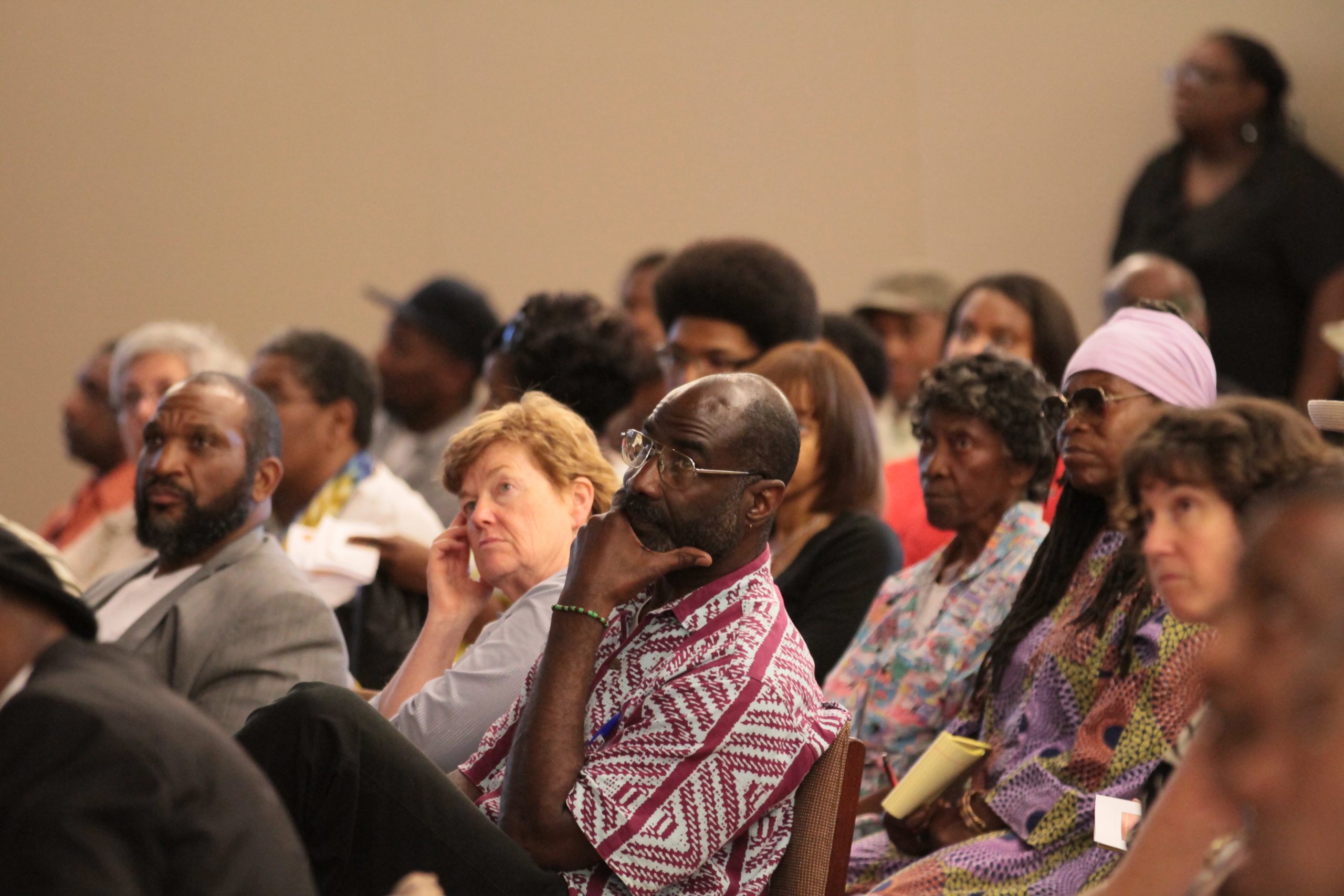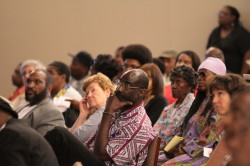
Last Saturday, June 1, Harmonious Solutions hosted a half-day town hall, “Breaking Down Barriers and Building Relationships” which brought together a number of service providers, community activists and clergy to discuss the issue of mental health in the Black community. Held at Bethel Seminary, the town hall focused on the needs of Blacks in San Diego, and how to promote access and treatment in a more comprehensive way.
Founded by Mr. Kahalifa King, Harmonious Solutions is a nonprofit facility offering counseling, mediation and training specifically designed to meet the needs of the diverse San Diego community. Harmonious Solutions collaborates with other agencies and organizations as a referral source to serve their clientele’s mental health needs. Additionally, it hosts regular community forums to address topics of interest and suggested by the community. Harmonious Solutions also serves as a training institution for culturally underrepresented, registered MFT interns seeking their professional license.
The town hall began with a presentation of the history of Blacks’ experiences in America. It was discussed that progress within the Black community has been made since the days of slavery; however Blacks still face a myriad of challenges including a consistently high unemployment rate, joblessness, poor access to healthcare and education. Contrary to popular belief, Blacks are dealing with mental illness in record numbers, and these numbers can be attributed to situations of today, as well as institutionalized racism that has existed for centuries.
“In 2007, US African American males in grades 9 – 12 were 1.6 times more likely to attempt suicide,” stated the moderator. He went on to say that from 2000 – 2008 African Americans were the third highest users of mental health services behind Whites and Hispanics. The top three mental health diagnoses among African Americans were depressive disorder, schizophrenia and bipolar disorder. “So our question is, what can be done?”
The town hall featured panelists from a variety of organizations representing different factions of the San Diego community. What followed was lively questions and dialogue which addressed the specific needs of African Americans when it comes to mental health. Mental health can involve many different types of treatment from a variety of sources. What Saturday’s town hall raised were that churches, service providers and the community as a whole need to be involved in the healing process for African Americans. Each panelist provided different insights to where and how to meet blacks where they are in the healing process.
The Voice & Viewpoint, which has been a strong supporter of Harmonious Solutions since its inception, was represented by publisher Dr. John Warren, who stated “I see us as an important link to this discussion as we serve as a link to the emotions of blacks. We have made it a practice to report positive news stories in our community, though we do not leave out other news. We report news from a Black perspective; we commend Harmonious Solutions for their efforts and the Voice & Viewpoint will not sit back and watch this community relax when our people are suffering through mental illness.”
Questions raised to the panelists were posed to invoke answers on how African Americans’ mental health can be impacted in a positive way. The first question asked was if slavery and its remnants have an effect on the mental health of African Americans in 2013.
“Yes,” said one panelist. “One of the things that have occurred is the passing down of oppressing views and values.” He explained that these traits are passed down from generation to generation. The moderator then questioned the panelists on addressing the issue and then utilizing coping tools available to African Americans. A panelist answered that in order to heal, it is necessary to go through the pain again to purge of it. Another panelist advised of the importance of looking at history, understanding it and it becoming a defining moment. Those defining moments enable healing.
“After all of this time, why are we still bound by what others think about us? Why is it so debilitating?” asked the moderator.
“One of the problems we have today is, we don’t need to go back 100 years,” said Dr. Warren. “We really need to go back 50 – 60 years. We find that there is a breakdown.” Dr. Warren mentioned spending time with Stokely Carmichael, Malcolm X and Rosa Parks, going on to say that we have not filled in the gap with today’s youth or ourselves in terms of history. “You can’t address what happened in the fifties following Brown [vs. Board of Education], you can’t ignore the Wilmington sit-ins, you can’t ignore the marches. There is an information gap.”
The moderator then asked, “How do we deal with people who don’t value us as people, and those who simply don’t care?” A panelist presented the fact that there is a level of dislike within the black community amongst each other. She mentioned that generations don’t often communicate with each other.
The issue of access was raised, revealing that access is multilayered. There is a lack of services available within the community; however, there is also a level of trust that lacks within Blacks when it comes to taking advantage of available resources.
A representative of the county sat on the panel to address the county’s lack of support in terms of funding for mental health services for the African American community. When asked what the county will do and whether or not Harmonious Solutions will continue to receive funding, he did not have a direct answer, but advised, “after looking over the numbers (in terms of how many people Harmonious Solutions has reached), those numbers support the need.”
When the floor opened for audience questions, there was a resonating theme of access within the southeastern community as well as an understanding that blacks live all over San Diego county, not only in southeast.
“We need to understand that we are not without power,” said Mr. Cecil Steppe, a prominent figure in the San Diego African American community. “We are very silent, polite people, allowing things to occur that we knew were not for our benefit. And yet we sat quietly and said nothing.” Mr. Steppe alluded to the fact that Blacks were hesitant to take active roles in questioning the county to make changes that would benefit blacks.
The point was also raised that, with the exception of Harmonious Solutions, there are not any culturally compassionate centers for existing mental health needs of blacks suffering with more common diseases such as schizophrenia.
Harmonious Solutions is more than a treatment facility, but a community organization that fills a void in the Black community in San Diego. It is vital that the county continue its funding, as the rehabilitation of the Black community contributes to the rehabilitation of the community in its entirety.


